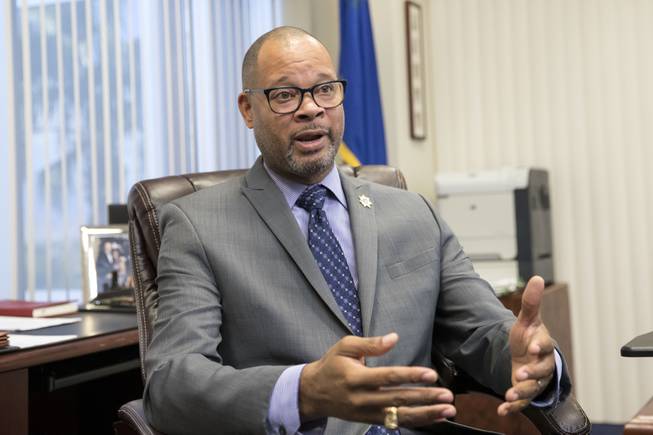
Richard Brian / Special to the Sun
Nevada Attorney General Aaron Ford takes questions from Las Vegas Sun political reporter John Sadler during an interview at Ford’s office at the Grant Sawyer Building Monday, Nov. 25, 2019.
Sunday, Dec. 29, 2019 | 2 a.m.
When President Donald Trump compared the impeachment inquiry concerning his dealings with Ukraine to a lynching, Nevada Attorney General Aaron Ford took to Facebook expressing his shock with the inaccurate comparison. “Mr. President, what you’re experiencing is not a ‘lynching.’ These are lynchings,” Ford wrote in a post that included graphic photographs of black lynching victims.
With Trump in the White House, hate crimes are at a 16-year national high, with 4,571 reported in 2018, including a spike in violence toward Hispanics, according to The New York Times. The Trump anti-immigration stances—such as the executive order travel ban suspending entry into the United States from Muslim-majority nations or the border wall proposal to prevent illegal crossing from Mexico—has emboldened some on the far right. The words and actions are startling.
“As you might imagine, as an African-American living in our country, I have a particular interest in ensuring that everyone is free from that form of fear and intimidation,” Ford tells the Weekly.
The Democrat has been on the job for about a year, establishing himself as a legal warrior in opposition to the Trump administration on many fronts, including the border wall immigration proposal and the push to declare the Affordable Care Act unconstitutional.
“I feel like I’m right where I’m supposed to be, representing Nevadans at this level,” Ford says. “I think it’s important to have someone that’s going to put Nevada families first, and every decision that I’ve made to this point has been based on exactly that question.”
Top priorities
Each state attorney general has certain issues that are integral to their office’s goals. For Ford, it’s consumer protection, ensuring constitutional and civil rights and tackling criminal justice reform.
“Every attorney general brings their own focus and priorities to this office,” he says. “[Sen.] Catherine Cortez Masto wanted to focus on sex trafficking and on the housing and foreclosure crisis. Adam Laxalt, to his credit, focused on guardianship issues and veterans’ issues, and I’ve continued those as well.”
Ford’s test for whether an issue deserves his office’s attention is simple. “Whether it’s a state policy, a federal policy, a rule, a regulation, whatever the case is, the question is simple: How is it affecting Nevada families?”
And two of the biggest issues affecting Nevada families have his attention. Ford is focused on combating human trafficking and the ongoing opioid addiction crisis. In October, Ford’s office hosted a human trafficking summit, where the latest research, law enforcement techniques and survivor resources were discussed with representatives from the social work and legal community.
“Aaron Ford is building upon the vital work I did on human trafficking and is holding pharmaceutical companies accountable for the opioid crisis, standing up for civil rights and protecting our veterans,” says Cortez Masto, the Democrat who served the state attorney general from 2006 through 2014. “I look forward to continuing to work with AG Ford to help protect all Nevadans and their families.”
Ford has positioned Nevada as one of the most voracious pursuers of legal action in the case focused around Purdue Pharma and the Sackler family, largely considered two of the parties most responsible for the opioid crisis due to their development and marketing of the drug OxyContin.
Ford says that while he appreciates the evolving public view of drug addiction as a health problem rather than a criminal issue, he has based the push against certain opioid manufacturers on statistics rather than public opinion.
“Make no mistake about it—the fact that it is a broader issue and is hitting more communities, I believe, has helped the public to view drug addiction as a crisis as opposed to an epidemic, if you will,” he says. “We’ve seen circumstances where crack cocaine was tearing up communities of color, but this form of outreach and effort to help those addicted to it wasn’t present.”
“We have a job to do here”
Ford says the mindset of residents could fall into one of three categories: those who trust and believe in the government, those whose trust has diminished and those who have no trust in the government. “It’s my estimation that the office of attorney general, at a minimum, should be focusing on augmenting trust where it already exists, restoring it where it’s been diminished and then creating it where it’s never existed in the first place,” Ford says.
Ford’s office juggles responsibilities ranging from challenges to federal law, pursuing criminal charges in the state, and defending state law. Simply put, it represents Nevadans in legal matters.
There are “400 or so people who work in this office who are truly dedicated public servants who understand the importance of what our position entails,” Ford says. “So I have people who help us to ensure that state crimes that we are responsible for prosecuting are, in fact, prosecuted.”
And, Ford says, his office will continues to fight for Nevadans—regardless of their background or party affiliation. He stressed the attorney general’s position is not a partisan office. “I believe that the office of attorney general and the people who reside in this state deserve to have someone serving in it that wants to put Nevada families first,” Ford says.
This story appeared in Las Vegas Weekly.
